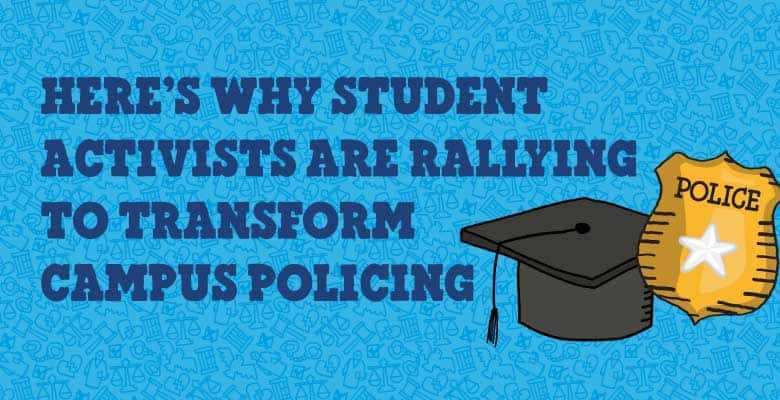September 1, 2022

At colleges and universities all around the country, students and student-led organizations are rallying to push their schools to abolish violent and militarized campus policing and hold officers accountable for their misconduct.
As more and more colleges and universities create or expand campus police departments, millions of students, along with tens of thousands of residents in bordering neighborhoods, are now under the jurisdiction of campus police officers, who routinely abuse and racially profile Black and Brown people on campus and off.
Young people are leading the way in demanding that we create a true system of public safety everywhere in America, and that includes on college campuses.
Accountability and Action
Despite the huge numbers of students and local residents they patrol, campus police are less transparent and have even less accountability than traditional police departments. Conventional police agencies, by law, make their records public. But many private colleges argue that campus police are exempt, making it much harder to investigate incidents of bias and violence.
Across the US, and right here in our home state of Vermont, students are demanding accountability. They’re demanding an end to racial profiling and abuse on college campuses. The University of Southern California (USC) found, for example, that 31.7% of 1,050 stops by its campus officers in 2019-20 involved Black people, although Black people made up just 5.5% of students, 8.8% of staff, 3% of faculty and 12% of neighbors. Similar examples of bias have been found on campuses all over the country.
The University of Chicago, with 15,000 students, has one of the largest private police forces in the world—which it also uses to patrol 50,000 residents who happen to live near campus. In response to the racial profiling of students and local residents by UCDP officers, University of Chicago students have called for the force to be abolished and for police funds to be used in support of students of color instead. They’re not alone: Student-led coalitions (which often include faculty and local residents) have called for ending the use of private police forces and/or cutting ties with local police departments at Columbia University, Harvard University, Johns Hopkins University, Ohio State University, Yale University, and elsewhere.
Racist Policing on Campus
Here’s why so many students have joined the movement to abolish campus policing: Campus police officers, like their counterparts in local police departments all over the US, have been harassing, assaulting, shooting, and killing people of color—students and local residents alike—with impunity, for years.
- Four Black men died at the hands of University of Cincinnati officers between 1997 and 2015. Charges were only brought against an officer in the case of Samuel DuBose, which ended in two mistrials.
- Morgan State University officers (along with officers from the Baltimore Police) killed Tyrone West in 2013 during an off-campus traffic stop. No charges were ever filed.
- A University of Chicago police officer shot fourth-year student Charles Thomas in 2018. Thomas survived. No action was taken against the officer.
- Portland State University officers shot and killed Jason Washington near campus in 2018 as he was trying to break up a fight. The officers did not face any charges, but the university ultimately decided to disarm its police force.
The examples of campus police violence go on and on. At a time when on-campus hate crimes have been on the rise, Black and Brown students continue to face racist mistreatment at the hands of campus police.
When we see all this, when we see that the number of Black people arrested by campus police is going up even as overall campus police arrests go down, we know that the problem is policing itself. Whoever campus police are supposed to be keeping safe, it’s clearly not students of color.
Campus Police Keeps Redlining Alive
American policing has its origins in Southern slave patrols and white supremacy. That legacy persists today in racist policing, in both policy and practice. Policing has always primarily been designed to serve the narrow interests of America’s white, wealthy ruling class.
Campus policing is no different. Many campus police departments were founded back in the 1940s and ’50s to maintain segregation—between predominantly white college campuses and the communities of color that had begun growing up around them.
Many of the country’s wealthiest, most selective colleges and universities were founded in cities hundreds of years ago. For much of their existence, their students (almost entirely wealthy, white, and male) lived on campuses that were surrounded by white neighborhoods.
Legal, federally supported housing practices like redlining barred Black people from buying and owning homes in neighborhoods like those, not to mention many others throughout the country. In an early civil rights victory, this overtly racist practice was (technically) abandoned in 1948. But while many Black people celebrated, leaders of universities and colleges were left wondering how to maintain white control of the neighborhoods around their campuses. They saw campus policing as the answer.
Making Arrests On and Off Campus
It’s important to say that even if policing started out as, and continues to be, a tool of the white elite, police violence, on campuses and off, hurts everyone. White students are not immune. To cite just two examples:
- A University of South Alabama officer shot and killed 18-year-old freshman Gil Collar in 2012. The officer claimed that Collar ran at him, but surveillance footage shows that never happened. A federal judge cleared the officer of any wrongdoing.
- A Georgia Tech campus police officer shot and killed a fourth-year student outside a dorm in 2017. The officer never faced any charges.
Today 92% of public colleges and 38% of private colleges have campus police. The number of campus police officers is increasing nationwide—and 94% of all officers are authorized to carry a weapon. Campus police budgets are increasing too. The University of California, for example, spent $75.3 million in 2009/10 for policing across its 10 campuses. By 2019/20 it was spending almost twice that, $148.5 million. Projections are that UC spending will keep increasing. Imagine if UC and other colleges spent that money on helping their students, instead of policing them.
Despite violent crimes at colleges dropping 27% between 2004 and 2011 (and despite data that suggests most arrests on campus are for low-level incidents involving alcohol and cannabis), departments keep adding officers every year, arming themselves with military weapons, and expanding their jurisdictions. Nationwide, 86% of officers are empowered to make arrests off campus.
How We Can Help
It’s time to create true public safety everywhere in America, including on college campuses. Enslaved people literally laid the foundations of many of this country’s colleges and universities. And today Black students are harassed, assaulted, and made to feel like criminals by the very people who are supposed to ensure their safety on the campuses they call home. This has to end.
Young people have been leaders in the effort to hold officers accountable and transform policing, both on campus and off. To stand with them, and transform public safety all across the country, take action and tell Congress to pass the People’s Response Act today.
Sweeten Up Your Inbox!
Subscribe Now And We'll Make Sure You Get The Inside Scoop On Ben & Jerry's Fun And Flavors! It's Like Dessert For Your Inbox, And You're Going To Want Seconds.


